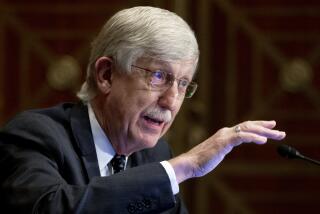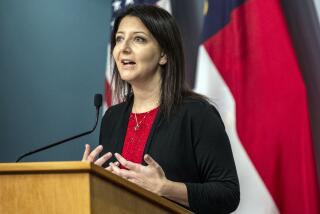U.N. Health Agency Director Says He’ll Resign
- Share via
NEW YORK — The controversial director of the World Health Organization, Dr. Hiroshi Nakajima, said Wednesday that he will step down when his term ends next year, a decision applauded by the United States and other countries seeking to reform the troubled agency.
The U.S. and other reform-minded nations have worked quietly for months trying to persuade Nakajima and his backers in the Japanese government that he should not seek a third five-year term as the head of the United Nations-affiliated agency, according to diplomatic sources in Washington and Geneva, where the WHO is based.
Nakajima, who disclosed his decision during an interview with Japanese journalists in Geneva, has been widely criticized as a poor administrator unable to articulate a renewed mission for the WHO. The Clinton administration has made rejuvenation of the organization a main item on its agenda for U.N. reform.
The WHO funds health care research, devises disease-fighting strategies, identifies emerging medical threats, serves as a repository for information on disease and medicine from around the world, sets international safety standards for food and drugs and organizes immunization projects. While it does not directly provide health care, it acts as a source of funding and information for government agencies that do, especially in the developing world. Perhaps its best-known achievement is leading the successful effort to eradicate smallpox.
During Nakajima’s tenure, the organization has lost funding, prestige and the confidence of some donor nations, particularly the U.S., which provides 25% of the annual $421-million budget and wants to reduce its share to 20%.
“The organization was created for a different world; the world today is one of infectious diseases, intercontinental airplane travel, biomedical research, and the WHO is going to have to change if it’s going to be relevant to the 21st century,” said Daniel Spiegel, the recently retired U.S. ambassador to the U.N. in Geneva.
Nakajima was seen as reluctant to pare the WHO’s sprawling bureaucracy and unable to refocus its programs to reflect a smaller budget. An effort to defeat his reelection in 1993, however, failed when the Japanese government rallied behind him.
When it became apparent that Nakajima was considering a third term, a coalition of industrial nations including the U.S. and developing countries in Africa and Asia formed to head off his reelection.
More to Read
Sign up for Essential California
The most important California stories and recommendations in your inbox every morning.
You may occasionally receive promotional content from the Los Angeles Times.










